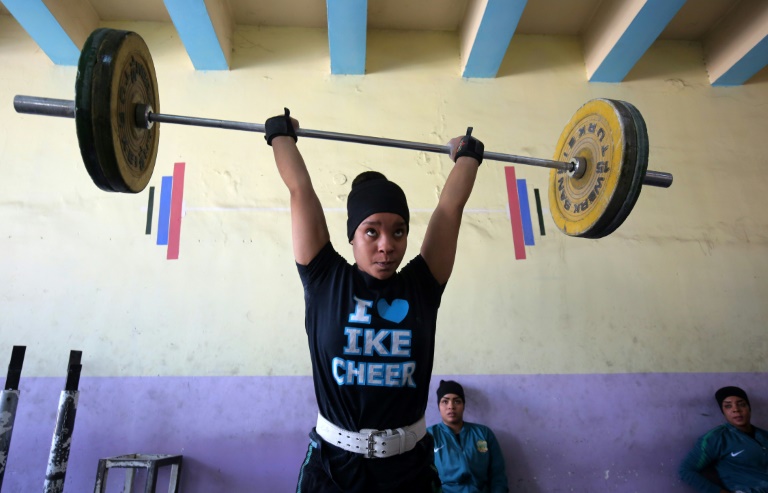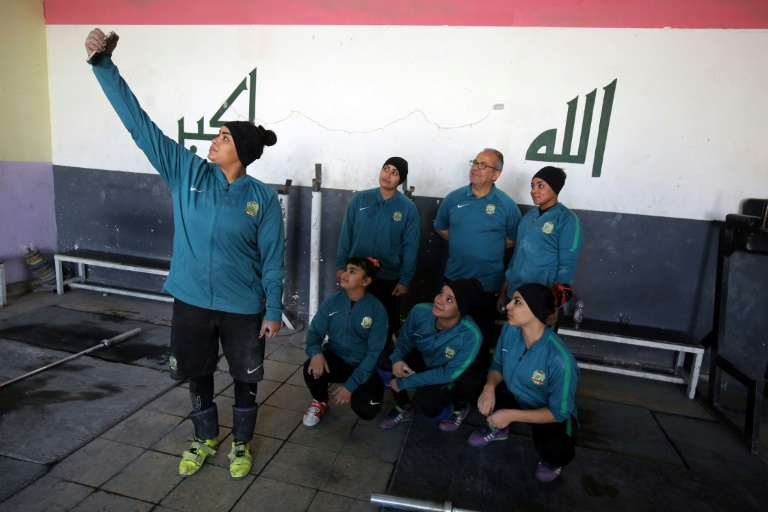24 hours in pictures, 12 December 2024
Jerking weights heavier than themselves at a rundown gym in Baghdad’s conservative Shiite neighbourhood of Sadr City, the young women and girls come together for three hours every day.
The girls are focused as they work out between the small gym’s peeling pale mint walls, one of which is adorned with a giant painted Iraqi flag.
With their dark hair in high buns and dressed in team green tracksuit tops, black shorts and leggings, they raise an arm and turn from side to side to warm up.
Then they work out hanging from a pull-up bar, before moving to different mats to get down to the business of lifting weights.
“To those who say weightlifting is not for girls, I say we can do everything men do,” says Huda Salim al-Saedi, 20, patting chalk powder from her hands.
“I challenge men to lift weights and I’m proud of it,” says the weightlifter, her eyebrows trimmed neatly and a black bandana keeping her hair from falling in her face.
Huda was one of the first to be recruited when coach Abbas Ahmed in 2011 set out to create Iraq’s first national female weightlifting team.
At first, it was an uphill battle.
– Society’s rejection –
“It was very, very hard,” says the former men’s coach, who is now 54.
“Society rejected the idea,” with conservatives considering the sport inappropriate for women and girls.
There was also no state funding for the project.
So Ahmed first approached families whose members were already fans of the sport.
Huda seemed like an ideal candidate. She had practised Taekwondo since the age of eight and had long been a fan of weightlifting on television.
Today, she’s a cornerstone of the Iraqi women’s team and its most promising member.

Huda helped to train her younger sister Hadeel Salem, 17, in weightlifting.
Huda helped to train her sister Hadeel, who just turned 17, and last year both of them competed in Asian championships.
The 20-year-old won bronze in the “snatch” discipline in her category at the Asian Championships in Turkmenistan, lifting 90 kilos in one swift motion above her head. She finished first overall at the Asian Junior Championship in Nepal.
Her younger sister Hadeel also competed there taking 10th place lifting 68 kilos in the “snatch,” while in another competition in Kathmandu, the Asian Youth Championships, she came in fourth overall.
But beyond making their relatives proud, Huda and Hadeel’s accomplishments have also provided their family with some financial security.
“Thanks to weightlifting, I have a salary and money to cover my family’s needs every month,” Huda says, with her sister’s pay cheque also helping make ends meet.
– ‘Welcomed as heroes’ –

Iraq’s national women’s weightlifting team is sponsored by the police club that pays each member a monthly salary of 0 to 0.
The women’s team is sponsored by the police club, which pays each of its eight members a monthly salary of $400 to $800 — a considerable sum for some families.
If Huda and Hadeel did not receive support from the club, their family could not pay their monthly rent of some $330, their father Salim Noma says.
Over time, he says, support has grown for the girls in the conservative neighbourhood.
“Everybody has ended up supporting them. They’re welcomed as heroes every time they return from a competition,” says Noma as he watches his daughters train.
Female weightlifting has provided an unexpected source of pride — and safety net — for some families in the working-class neighbourhood.
Loujain Hazem, 15, gave up her studies to focus on the sport, winning a silver medal at the West Asia championships in Jordan last year.
“Our coach has taught us determination and perseverence,” she says.
“I’m sure our efforts will pay off, in terms of both weightlifting and money.”
The younger generation is also dreaming big.
Every day after shool, the father of 12-year-old Roqaya picks her up and they weave through the traffic jams of Baghdad on his moped to the gym in Sadr City.
With her hair tied in a pink bow, she lifts two large red weights above her head.
“I hope one day to take part in the Olympics,” says Roqaya, already aiming high.
Download our app and read this and other great stories on the move. Available for Android and iOS.